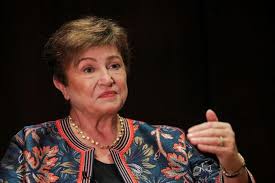News Flash
News Flash

WASHINGTON, Oct 8, 2025 (BSS/AFP) - The global economy is doing better than
expected, even as it faces prolonged uncertainty and underwhelming medium-
term growth prospects, the head of the IMF said Wednesday.
The world economy is doing "better than feared, but worse than we need,"
International Monetary Fund Managing Director Kristalina Georgieva told
reporters in Washington, according to prepared remarks.
She added that the Fund now expects global growth to slow "only slightly this
year and next," propped up by better-than-expected conditions in the United
States, and among some other advanced, emerging market and developing
countries.
Georgieva's remarks came ahead of next week's gathering of finance ministers
and central bank governors at the World Bank and the IMF in Washington.
Trade is once again likely to dominate the agenda at the annual meetings,
following US President Donald Trump's decision earlier this year to unleash
sweeping tariffs against many countries.
- 'Multiple shocks' -
"All signs point to a world economy that has generally withstood acute
strains from multiple shocks," Georgieva said, pointing to "improved policy
fundamentals," the adaptability of the private sector, lower-than-expected
tariffs, and supportive financial conditions.
"The world has avoided a tit-for-tat slide into trade war -- so far," she
added.
She noted that the US tariff rate has fallen from 23 percent in April to 17.5
percent today, a figure that nevertheless remains "far above" the rest of the
world.
But, she warned, the full effect of those tariffs "is still to unfold,"
adding that the resilience of the world economy has yet to be "fully tested."
Against this backdrop, the Fund still expects global growth to remain at
roughly three percent over the medium term, in line with previous forecasts -
- below the 3.7 percent, on average, seen before the Covid-19 pandemic.
To boost lackluster growth prospects, Georgieva called on countries to act
swiftly to "durably" lift output, rebuild fiscal buffers, and address
"excessive" trade imbalances.
The Fund's prescriptions for policymakers differed by region, with Asia urged
to deepen its internal trade, and to strengthen the service sector and access
to finance.
Carried out correctly, this could raise economic output by as much as 1.8
percent in the long run, she said.
On the African continent, Georgieva called on countries to promote "business-
friendly reforms," and continue with efforts to build up the Continental Free
Trade Area which, she said, could lift their real GDP per capita by "over 10
percent."
- Tough love for Europe -
Georgieva reserved her harshest criticism for Europe, which has struggled
with economic growth in recent years, in marked contrast with the United
States.
To raise competition in the bloc, Georgieva called on the European Union to
appoint a new "single market czar" to drive reforms, a move that would
simplify the EU's structure and consolidate the power to make the changes
required.
These changes include steps to deepen EU single market integration in
financial services and energy.
"Complete your project, and catch up with the private sector dynamism of the
US," she said.
For the world's largest economy, Georgieva urged the Trump administration to
address the country's federal deficit, and to take steps to incentivize
household savings.
And for China, the world's second-largest economy, Georgieva reiterated the
IMF's ongoing calls for fiscal reforms to boost private consumption, and
reduce dependence on industrial policy to drive growth.